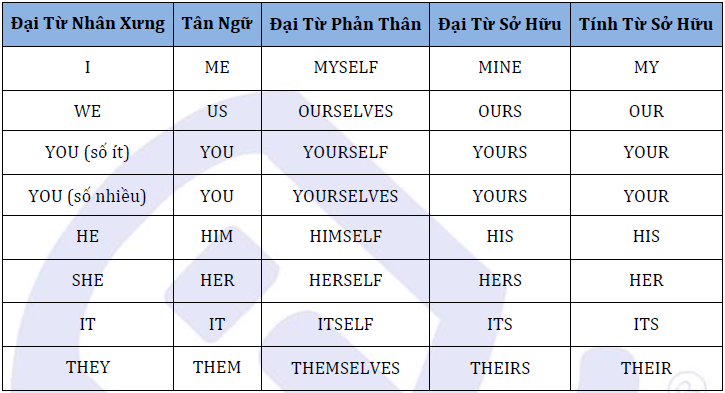Tổng hợp lý thuyết về tính từ sỡ hữu cần biết
Bạn đang hoang mang không biết tính từ sỡ hữu trong tiếng anh là gì, các dạng bài tập về tính từ sở hữu như thế nào? Đừng lo, Cunghocvui sẽ cùng bạn tìm hiểu tính từ sỡ hữu là gì, chỉ ra cho bạn bảng tính từ sở hữu giúp dễ dàng học và ghi nhớ sâu. Bắt tay vào học thôi!
I) Tính từ sỡ hữu trong tiếng anh
1) Tính từ sở hữu là gì?
Tính từ sở hữu là từ đứng trước danh từ để cho ta biết được rằng danh từ đó là của ai.
2) Cấu trúc
Tính từ (Adj) + Danh từ (N)
3) Bảng tính từ sở hữu
| Đại từ nhân xưng | Tính từ sở hữu |
| I | My |
| One | One's |
| You | Your |
| He | His |
| She | Her |
| We | Our |
| It | Its |
| They | Their |
4) Chức năngBổ nghĩa cho danh từ
- Thể hiện tính chất sở hữu của người hoặc vật đối với danh từ đi sau nó.
VD: My bike is red.
5) Cách sử dụng

(Mối quan hệ gữa tính từ sở hữu với các đại từ khác)
6) Lưu ý
- Đại từ sở hữu không đứng trước danh từ như tính từ sở hữu
- Không nhầm lẫn giữa "Its" với "it's"
II) Bài tập tính từ sở hữu
Bài tập 1: Use possessive adjectives to complete this dialogue.
LIAM: Have I shown you these photos of (0) ............ my family?
ANNA: No, you haven’t. I’ve never seen any photos of (1) . . . . . . . family.
LIAM: Look at this one. Here you can see me in the middle and on (2) . . . . . . . left is (3) . . . . . . . brother, Richard.
ANNA: Is (4) . . . . . . . brother older than you?
LIAM: Yes, he’s 32. Next to him is (5) . . . . . . . wife. (6) . . . . . . . name is Sarah and she’s holding (7) . . . . . . . new baby. On the left of the picture is Tilly and (8) . . . . . . . husband, Dave.
ANNA: Ah, yes, I’ve met Dave (9) . . . . . . . family lives in Australia.
LIAM: (10) . . . . . . . grandparents – my dad’s parents – are sitting at the front. Richard and Sarah’s older children are sitting on (11) . . . . . . . knees.
ANNA: And where are (12) . . . . . . . parents?
LIAM: Mum and Dad are in this other photo here, look . . .
Đáp án
1. your 5.his 9. His
2. my 6. Her 10. My
3. my 7. their 11. their
4. your 8. her 12. your
Bài tập 2: Complete this dialogue by putting a possessive adjective, a possessive pronoun, who, whose, it’s or its in each gap.
ZOE: What’s your favourite hobby?
ZAC: Swimming. What’s (1) . . . . . . .?
ZOE: My sister and I are into skateboarding. We’ve just got new boards. I bought a British one but (2) . . . . . . . is American.
ZAC: (3) . . . . . . . is best?
ZOE: I think (4) . . . . . . . is, of course! Grace got an American one because she says (5) . . . . . . . wheels are stronger, but (6) . . . . . . . board doesn’t feel very different from mine. And I think (7) . . . . . . . a horrible colour too!
ZAC: Isn’t skateboarding dangerous? (8) . . . . . . . mum won’t let me try it.
ZOE: Not if you’re careful like me, but Grace broke (9) . . . . . . . arm last year.
ZAC: And do you go in for competitions?
ZOE: Yeah, we do these team events (10) . . . . . . . team came third the last time we entered. (11) . . . . . . . exciting to skate against other people.
ZAC: Perhaps you’ll do even better with (12) . . . . . . . new boards.
Đáp án
1.yours
2. hers
3. Whose
4. mine
5. its
6. her
7. it’s
8. My
9. her
10. Our
11. It’s
12. your
Trên đây là bài viết mà Cunghocvui tổng hợp được về tính từ sở hữu trong tiếng anh, bài tập về tính từ sở hữu giúp bạn học tập tốt hơn. Thấy hay đừng ngại mà chia sẻ để mọi người cùng biết nhé!

